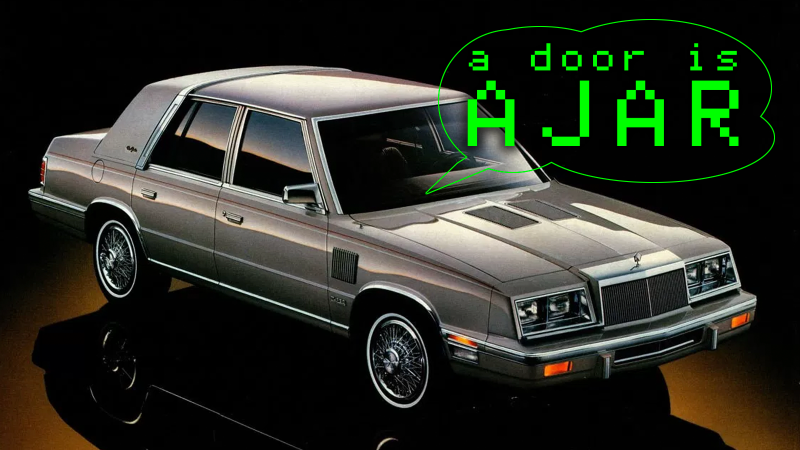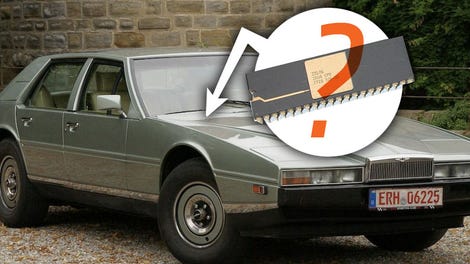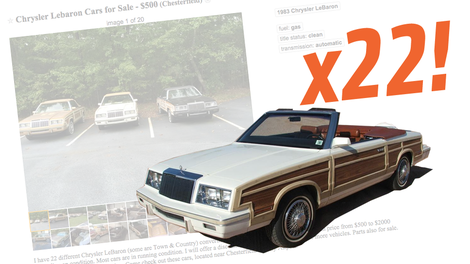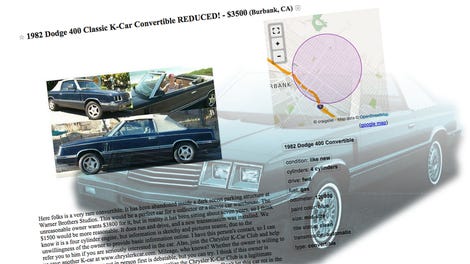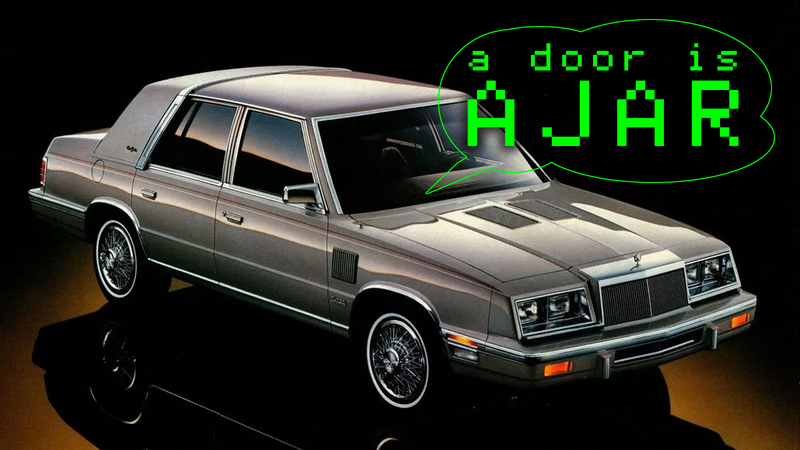
I should be clear here that I’m not an official expert in words; I’m no entomologist. You can tell that’s true because I just typed the word for someone who studies insects, not “etymologist,” someone who studies words. But this hasn’t stopped me from formulating a theory that there’s a large number of people who learned the word “ajar” from a talking car.
Here’s my theory: the word “ajar” is a fairly uncommon word. Most people tend to call a door that’s not closed, whether it’s slightly not closed or flung wide, just “open.” For some reason that I haven’t been able to determine, Chrysler chose the word “ajar” to be used to describe the status of non-closed doors when picking the phrases for their Electronic Voice Alert (EVA) system, launched on 1983 car models.
Advertisement
The EVA system was based on a Texas Instruments TMC0281-family chip, closely related to the speech synthesis chip used in the famous Speak n’ Spell toys. Chrysler stuck these speech-synthesis modules in a whole crapload of their higher-end K-Car-based cars like New Yorkers and LeBarons and Daytonas and Lasers.
Advertisement
These cars were fairly common when I was a kid, and I think, thanks to carpooling, rides in friend’s parents’ cars, and things like Boy Scouts and the occasional abduction, almost every kid I knew ended up in somebody’s speech-enabled Chrysler at some point, and once in those cars, they heard the car say “a door is ajar.”
I learned the word “ajar” from a talking Chrysler. I know many of my friends did as well. I believe that a significant number of people heard the word ‘ajar’ for the first time around 1983, and I suspect the word had a notable increase in popularity from that point, all thanks to these talking cars.
Advertisement
I reached out to several University English departments to try and get some confirmation. Shockingly, none has gotten back to me. I was able to find at least one graph charting the word “ajar” and its use and popularity via Google:
This chart shows the popularity of ‘ajar’ in books from 1900 on. As you can see, the word was in a pretty consistent decline, bottoming out around 1970. It started to creep up after that, and after 1983 you can see a very healthy increase, a trend that continues to today.
Advertisement
I firmly believe that the sustained increase post 1983 is the result of people, like myself, who learned the word ‘ajar’ from a car.
I haven’t been able to find any record of the spoken use of “ajar,” because I’m pretty sure no such record exists. I bet, though, there would be a huge spike in the early ‘80s, when jokes like “When is a door not a door? When it’s ajar!” caused dorky kids in the back seat of LeBarons to eject laughter-milk out of their nostrils.
With the absence of hard data, I’d at least like to reach out to you, the world’s finest, most sensual audience of automotive enthusiasts, to see if there’s a significant number of you who learned the word “ajar” from a motor vehicle.
Advertisement
As an aside, in case you’re wondering why more modern cars don’t speak to us anymore, reminding us to de-ajar our doors and that they crave oil so badly, I think the answer can be found here, in this anecdote from Burton Bouwkamp, Director of Chrysler’s Body Engineering department back in the early ‘80s:
I told Dick Rossio (Executive Engineer of Body Electrical) that the voice alert was getting on my wife’s and my nerves and I asked him how to turn it off. Dick said there was no way to cut a wire without making the car illegal for some of the Motor Vehicle Safety Standards. I told Dick to find a way. Consequently, after the first 10,000 cars were built with the EVA feature, wiring changes were made and a switch was added behind (forward of) the glove box so an agile owner – or a dealer mechanic – could turn it off.
So, there’s the answer: even the people who ran the company soon found the talking annoying.
Advertisement
Advertisement
I’ll leave the comments ajar here so you can tell me where you learned the word.
Then the car starts asking “WHAT IS THIS THING CALLED LOVE” and all hell breaks loose

